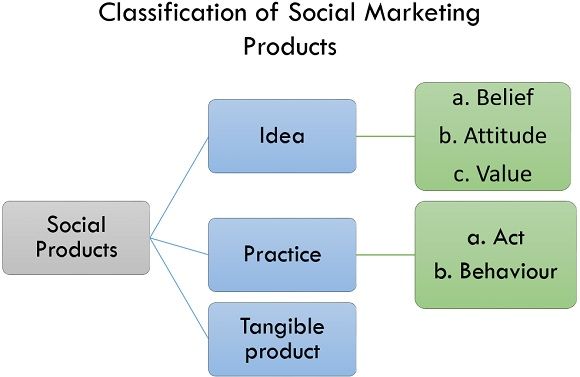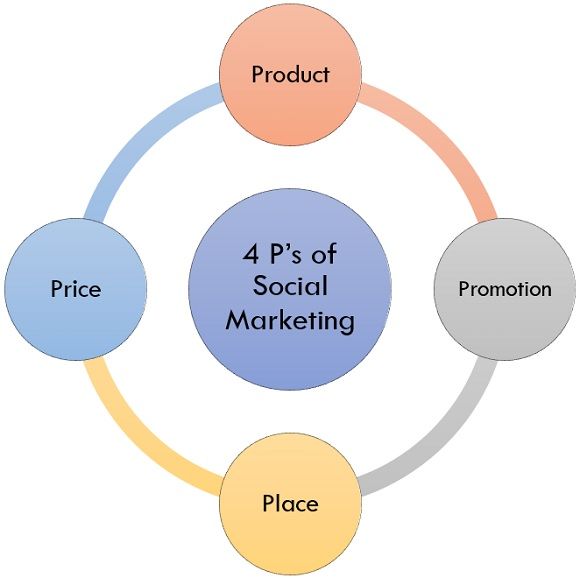Definition: The word “Social Marketing” was introduced in 1971 to specify the increasing use of marketing tools and techniques to advertise social belief, objectives and actions. It has developed into a social reform management technology associating outline, application and management of programs designed for raising the prominence of social idea, purpose or application amidst target accepting groups.
Social Marketing is the function of marketing techniques to transmit socially constructive ideas or actions. It is an approach for the dynamic behaviour of the most significant shareholders. It incorporates the best components of the traditional approach to social transformation in a centralized planning and operation framework. It makes use of leading communication tools and techniques with marketing proficiency to attain an expanded audience. It is arranged to affect the behaviour of the spotted audience in which the advantages of behaviour are planned by the marketers to arise mainly to the audience or to the community in general and not to the marketer. It is sometimes distracted by the social impact of marketing. Personal, private and public non-profit organizations and profit-making organizations can accomplish social marketing plans.
Social marketers apply the idea of market segmentation, customer research social products layout and improvement communication and operation management to escalate target accepter class response rate. The social marketer chases reform targets with the belief that it will do better justice to the community at large. Social marketers apply the idea of market segmentation, customer research, social products layout and improvement, communication and operation management to escalate target accepter class response rate. The social marketer chases reform targets with the belief that it will do better justice to the community at large.
The social marketer needs innovations in concepts people hold pointing to objectives, tradition and rituals, which are recognized as unfavourable. These are the eventual targets of the social marketing program. Thus, we can say that “Concepts” and “Behaviour” are social products to be displayed to aim at accepting groups. Kotler characterizes three classes of social products, i.e., idea, practice and tangible object.

Social marketers may seek distinct goals. Some examples are as follows:
- Doctors need people to avoid smoking to protect them from cancer.
- Government has popularized family planning schemes to restraint the alarming population increase.
- Government has made it mandatory that all children over five years must be sent to school to raise literacy.
- Government provides toothbrushes for free to school-going children to maintain their teeth clean against corrosion.
- Government enforce scooter user to use helmets to avert deadly head injuries.
Content: Social Marketing
- 4 P’s of Social Marketing
- Examples of Social Marketing
- Features of Social Marketing
- Advantages of Social Marketing
- Conclusion
4 P’s of Social Marketing
The four P’s of social marketing are described below:

1. Product
- Producers may be asked to produce cigarettes with filter fitters.
- Cigarettes can be manufactured with less injurious components.
- The concentration of smokes can be deflected to replacement.
2. Promotion
- Build a fear of death or affliction in the smoker’s mind.
- Recommend them to reduce the number of cigarettes.
- Introduce them to the mortal consequences of smoking.
3. Place
- Availability of cigarettes can be decreased.
- Let smokers figure out the benefits of not smoking.
- Trim the number of shops trading cigarettes.
- Transfer the cigarette shops to distant places.
4. Price
- Raise the cost of cigarettes.
- Raise the premium amount of LIC of smokers.
- Policies can be approved to break smoking habits adoring non-monetary rewards, etc.
The four P’s can be used to have a beneficial impact to attain the goal. New smokers can be shielded, which is more straight-forward than punishing smokers. Marketing may be used to channelize products to customers and deliver the social aspiration to the market or the customers. The use of marketing theories for social welfare is termed as social marketing.
Examples of Social Marketing
- Case 1
Lipton offered traffic cops Lipton’s refreshing ice tea.
In summer, traffic cops deal with noise pollution, dust-hampered wind and extensive heat to perform their duty. Lipton decided to handover its ice tea bottles to traffic cops to help them endure the summer heat. Lipton chose New Delhi and NCR Regions, where 6,250 traffic cops manage around 1.5 crore vehicles daily with the average summer temperature reaching 40°C.
- Case 2
Gulf Lubricants provided 1,000 helmets to Mumbai Police.
“Ride for Safety” is a year-end ceremony arranged by Wheelie Boy proposed to upturn an awareness in respect to road security amidst two-wheeler owners. To promote road safety, Mr. Manish Gangwal (CFO, Gulf Lubricants India) announced a contribution of 1,000 helmets to Mumbai Police. A replica of the helmet to be given to Mumbai Police was also unveiled at the event.
Features of Social Marketing
Following are some of the features of social marketing:
- It includes bothersome to modify an individual’s actual behaviour.
- As a social marketer, we must understand the individual whose behaviours we are trying to modify.
- Dynamic behaviour generally includes people giving costs to gain benefits.
- In crafting behaviour change interventions, we need to consider what else competes for our audience’s time, attention, and their tendency to behave in a certain way.
- Not everybody is the same, so a one size fits all ways are not often the best.
Advantages of Social Marketing
Some of the advantages of social marketing are as follows:
- Popularize consumption of socially enviable products.
- Promotes health awareness in people and helps them choose a healthier lifestyle.
- It provides aid in a green marketing initiative.
- It helps to abolish social evils that influence society and quality of life.
- Social Marketing is one of the economical ways of marketing.
- Anyone can take benefits of it, even from their home, and it is one of the best advantages of Social Marketing.
Conclusion
Social Marketing is a definite practice that has been classified since the 1970s and introduces mainly to efforts directed on affecting behaviours that will enhance health, avoid injuries, safeguard the environment, contribute to society and more freshly improve financial well-being.
Leave a Reply